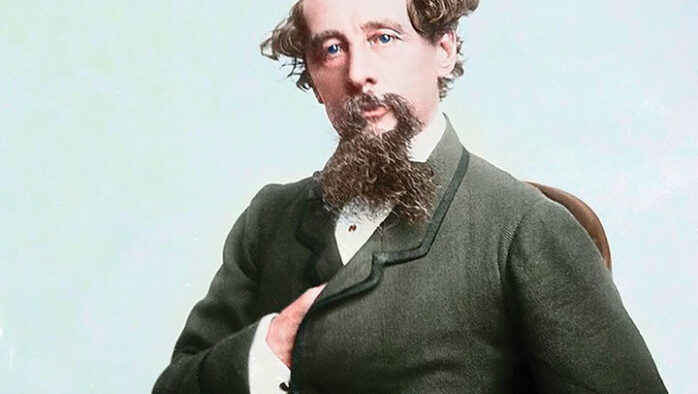
Submitted
Charles Dickens’ “A Christmas Carol” provides a glimpse into the
understanding that Scrooge’s redemption will lie in regaining his soul.
The story is probably the best known story of Christmas in
the English language.
By Julia Purdy
After the Gospel, Charles Dickens’ “A Christmas Carol” is probably the best known story of Christmas in the English language.
Since 1900, the entertainment industry alone has produced at least 50 versions for film and TV. We enjoy “Carol” like a box of Christmas candy, a cornucopia of special effects, as Dickens intended. He offers us this rich visual feast as a vehicle for the message closest to his heart.
Until Dickens came along, Christmastide was primarily a liturgical observance, not a popular holiday in the modern sense. Yet in Christmas, Dickens saw his chance to press for a new morality that begins with individual conscience, a spiritual redemption and rebirth on a personal level, available even – and especially – to misers like Scrooge.
In the 1840s he wrote a set of short novels known as the “Christmas Books,” beginning with “A Christmas Carol” in 1843. He composed “Carol” in six weeks and it sold 6,000 copies immediately.
From 1850 to 1867, he published an annual Christmas issue for his own popular family magazine, All the Year ‘Round. By the time of his death in 1870, Dickens had left his stamp on the Christmas season – the “Victorian Christmas” we know today.
Certainly the symbol of the sacrificial child resonated with the dark bitterness of Dickens’ own childhood. His modest but careful upbringing ended when his father was sent to Marshallsea debtors’ prison, and the boy had to leave school at age 12 to join the army of child laborers in a factory that made stove blacking and shoe polish.
He later was able to resume his education and sharpened both his pen and his wit as a streetwise newspaper reporter. The result was the kind of mind that could record without blinking the good, the bad and the desperate, yet with a compassion and an overriding faith in the essential goodness of ordinary people.
Certainly, Dickens never turned a blind eye to injustice. Film renditions of “Carol,” however, rarely emphasize Dickens’ condemnation of public policies and traditional attitudes that fostered a climate of callousness toward the working poor.
In 1776, Adam Smith’s “The Wealth of Nations” laid the foundations of laissez-faire capitalism, which is not so much a policy as the almost total absence of one. This theory holds that the law of supply and demand (today’s “market forces”) is tantamount to a law of nature, above and beyond human influence. Thus government regulations or protections are viewed as not only unnecessary and futile, but undesirable. The demands of “the economy” trump everyday human needs, rights and priorities.
This new thinking explained away the shortcomings and failures of society’s “losers” as their own fault; the causes of poverty were put down to “idleness” or overpopulation, or both. The New Poor Law in 1834 (which Scrooge cites as a reason not to donate to a charity drive) assigned debtors to do backbreaking labor in prison-like workhouses, segregated by gender. The fabric of normal family life disintegrated.
When the “portly gentlemen” come to collect donations on Christmas Eve, Scrooge grumbles that he already donates to the workhouses and debtors’ prisons, and if poor people “would rather die than go there, they had better do it and reduce the surplus population,” adding that it’s “not my business” to know the fate of the poor. The perennial gripe of England’s new man of business is Scrooge’s own gripe.
Against the “dismal science” of profit-and-loss, Dickens contrasts his own vision of life and hope in the form of Scrooge’s jolly nephew, the benevolent employer Fezziwig and Tiny Tim’s penniless but loving family. He proffers models of conscience and true charity in the persons of the portly gentlemen.
Scrooge is indeed a soul cut off from the main stream of humanity. But he is not evil. He is a product of the commercial mindset that surrounds him. He still is capable of remembering, observing, learning and repenting. He is forced to revisit his innocent youth full of moments both lonely and joyous. He is reminded how he lost out on a happy marriage and family when it became apparent that his money-hunger was replacing his devotion to his fiancée, who did not share his ambitions.
Dickens carries this profound message of personal service across without once intoning Scripture. But when Scrooge, after his ordeal, finds himself in the giddy, sublime state of an innocent baby, we are given to understand that Scrooge’s redemption will lie in regaining his soul—that portion of everyone, whatever his, her or their station in life, that makes common cause with the whole human race.

